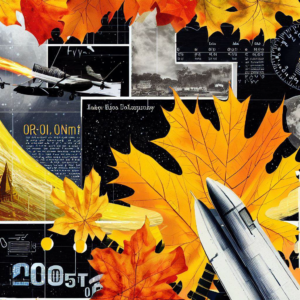Throughout history, specific dates hold significance due to the events they harbour. The 21st of October is no exception. A myriad of happenings have occurred on this day, spanning various fields and influencing the course of history in numerous ways. Here, we explore some of the prominent events that unfolded on this day.
Today in History: 21 October

1. The Battle of Trafalgar (1805)
One of the most famous naval battles in history occurred on the 21st of October 1805: the Battle of Trafalgar. This confrontation between the British Royal Navy, led by Vice Admiral Lord Horatio Nelson, and the combined fleets of Spain and France marked the end of Napoleon Bonaparte’s ambitions to invade Britain. The British fleet emerged victoriously, though it came at a heavy cost – Nelson lost his life. His legacy and the significance of this battle in asserting British naval supremacy cannot be overstated.
2. The Guggenheim Museum Opens in New York (1959)
Designed by the iconic architect Frank Lloyd Wright, the Solomon R. Guggenheim Museum in New York opened its doors to the public on this day. Its distinctive spiral design has made it one of the 20th century’s most iconic buildings. Not only is it an architectural masterpiece, but the museum also houses an impressive collection of modern and contemporary art.
3. Thomas Edison’s Electric Light (1879)
On October 21, 1879, Thomas Edison successfully tested an electric light bulb that used a carbon filament, allowing it to burn for hours. This invention revolutionized the way we light our homes and streets, heralding a new era and sidelining the use of gas lamps. Edison’s work laid the foundation for the electric power industry.
4. “Apple Day” in the UK (1990)
The first Apple Day was held in Covent Garden, London, on October 21, 1990. This day was initiated to demonstrate the variety we are in danger of losing – not just of apples but of the richness and diversity of all our landscape and ecology. The event has now become an annual celebration of apples and orchards.
5. The Aberfan Disaster (1966)
In a tragic turn of events on this day in 1966, a colliery spoil tip collapsed onto the Welsh village of Aberfan. This catastrophe resulted in the deaths of 116 children and 28 adults. The event highlighted the dangers of mining and led to significant changes in UK policy and legislation regarding public safety.
6. Birth of Samuel Taylor Coleridge (1772)
On this day, English poet Samuel Taylor Coleridge was born. He was a central figure in the Romantic poetry movement and is best known for poems like “The Rime of the Ancient Mariner” and “Kubla Khan.” Along with other Romantic poets, he brought about a new age of literature where emotion and individual experience were central themes.
7. Women Vote in Federal Election in Canada (1918)
21 October 1918 marked a significant milestone for women’s rights in Canada. On this day, most women over the age of 21 became eligible to vote in federal elections. This decision, however, excluded some groups, like Indigenous women, who had to wait several more decades before they could cast their votes.
8. Ceylon Becomes Republic of Sri Lanka (1972)
On this day, the country previously known as Ceylon officially became the Republic of Sri Lanka. The name change represented a shift away from its colonial past and the start of a new era in the nation’s history.
9. First Meeting of the United Nations (1945)
In the wake of World War II, representatives of the major Allied powers convened in San Francisco for the inaugural meeting of the United Nations. This organization’s formation aimed to promote global cooperation and prevent future world wars.
10. “Bloody Sunday” Events in Northern Ireland (1968)
A civil rights march in Derry, Northern Ireland, turned violent when it was intercepted and attacked by British troops. This event, which came to be known as “Bloody Sunday,” was one of the sparks that ignited years of sectarian conflict in Northern Ireland.

In Retrospect
October 21 is replete with events that have shaped the world in various ways, from monumental battles to strides in technology and art. Each of these events, whether uplifting or tragic, serves as a testament to the ever-evolving narrative of human history. They remind us of our achievements, our challenges, and the lessons we must take as we forge ahead into the future. The interconnectedness of events, the ripple effects of decisions, and the imperishable impact of individual and collective actions are all encapsulated in the rich tapestry of this day. As we stand on the precipice of the future, we are reminded that our actions today will become the history of tomorrow, urging us to tread with awareness, responsibility, and hope.
